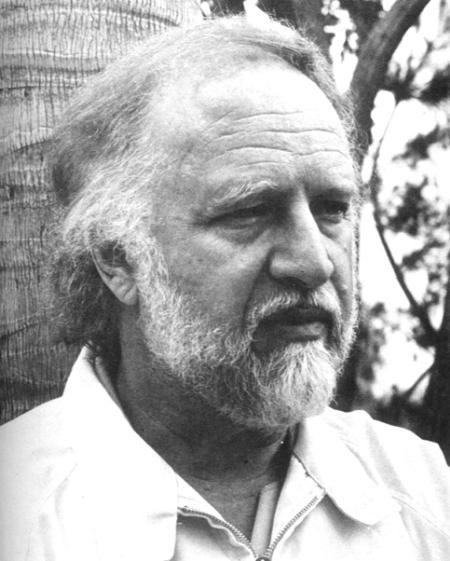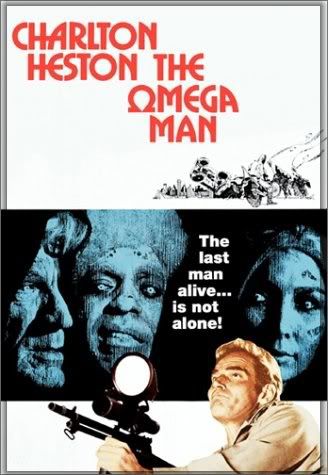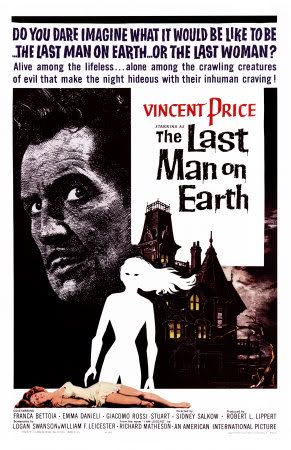Richard Matheson's 1954 novel I am Legend has been given three film adaptations as of 2007. In the past two years I have read the book and seen all three movies. I'd like to apply some grade school compare and contrast tactics to these four pieces of work.
I'll start where I started. I saw I am Legend (film, 2007) when it was in theatres. At the time I thought it was great. I really enjoyed the post-apocalyptic feel and the special effects. As a huge fan of Will Smith, I knew I would enjoy a movie which featured him as the only man on a desolate version of Manhattan.
Many of my friends had already read Matheson's book, and though I hadn't, I had enough confidence in the film after seeing it to recommend it to them. I know now that this was ill-advised.

Richard Matheson
Matheson's book is the tale of Robert Neville, seemingly the last survivor of a viral outbreak that turns people into vampires. The novel does a fantastic job with the themes of desolation and loneliness. Although it is told in the third-person, it really puts the reader in Neville's lonely, desperate world. Neville in the book is a man with some serious flaws, not the least of which is an on and off problem with alcohol. None of the three films seem to portray the main character this way, instead opting for a more stoic leading man.
After reading the book, I checked out The Omega Man (1971), featuring Charlton Heston. Out of all three films this version strays the furthest away from the book. Rather than vampires, a majority of the population has become part of "the family," a cult of albinos who chase Neville around downtown Los Angeles (the book was based in Los Angeles, as were the first two film adaptations). Although it is somewhat unclear what made "the family" the way they are, it can be inferred that they have suffered some kind of radiation poisoning from a nuclear weapon. Their mission is to destroy all technology, especially military technology. I guess this change from book to film was a reflection of the time in which is was the film was made.

One thing I am Legend 2007 and The Omega Man both got totally wrong is the ending. In the novel, Neville is in fact the last man on Earth. The novel ends when he is captured and killed by a militant group of what some vampire enthusiasts would call "half-breeds." These are infected humans keeping the viral side effects at bay with medications. They see Neville, the uninfected (and immune) man as a threat and so they dispose of him. It is a sad and great ending to a great story. The human race is no more, hence I am Legend.
I think the makers of both I am Legend 2007 and The Omega Man thought the book was called I am LegendARY because they both give Neville a heroic, schmaltzy Hollywood ending. In both these films Neville is killed at the end, but not before saving the human race with a vaccine he had devised and passed along to another survivor.
This change to the ending on the part of both films was a massive miss. One of the main points of Matheson's novel is that the human race is over. The whole book has a desolate yet claustrophobic feeling, capped off with the back breaker of Neville actually dying. Making Neville the savior of the human race completely throws this breathtaking concept right out the window.
So, does The Last Man on Earth (1964), featuring Vincent Price as Neville and with a screenplay written by Matheson himself, get any of these major themes correct? I think so.

Although Matheson was not happy with how the film came out, it played out pretty much how I imagined while I was reading the book. First of all, it got the ending right, albeit with some major dramatic points changed around. Also I felt the scenery in the film, being much more suburban than the other two films, matched the book quite well. I expected Vincent Price to play the part like a weirdo, but he handled it very well with very little cheesiness. I would consider this to be hands down the best film adaptation of the book, but I wonder if I would think so if I saw this movie before reading the book.
I am glad my friends encouraged me to read Matheson's book. Thank you John, for giving it to me for my birthday last year. I would recommend all three films to any fan of the book, but only as an exploration of the many different ways a literary work can be adapted to film, and in particular, over a pretty long period of time for a modern work.
No comments:
Post a Comment